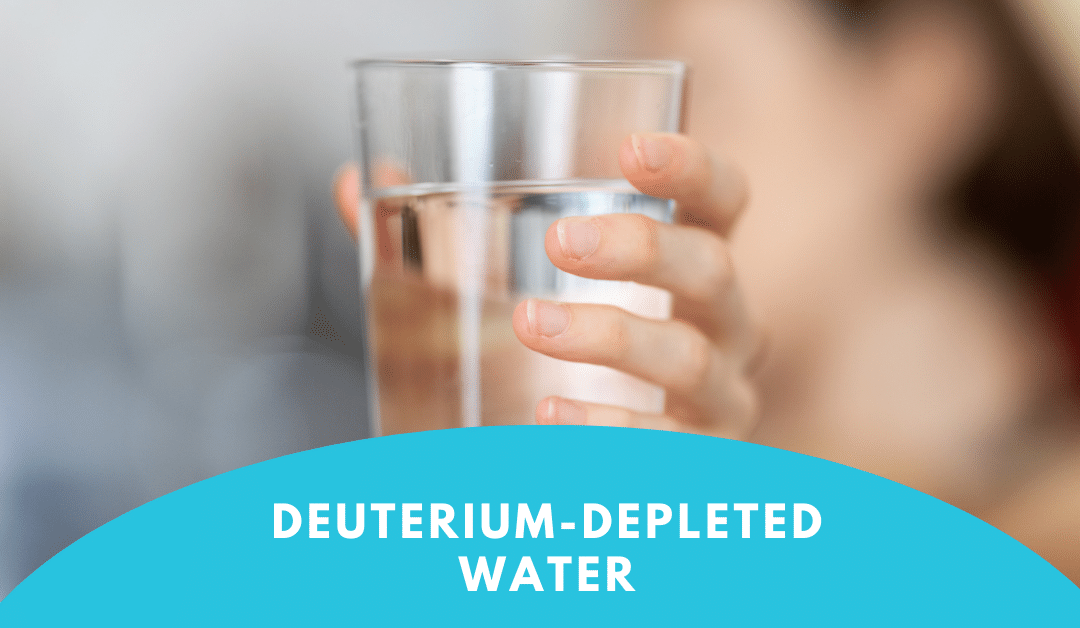Deuterium-depleted water is one of the latest crazes within the mitochondrial health research community. Deuterium is one of the two stable isotopes of hydrogen and is also known as “heavy hydrogen.” Deuterium has an extra neutron and double the atomic weight of regular hydrogen. Standard hydrogen known as “light hydrogen” has one proton and one electron. Deuterium was discovered in 1931 by Harold C. Urey, a chemist at Columbia University who would later earn a Nobel Prize in Chemistry in 1934 for the discovery of protium, deuterium, and tritium. Deuterium is found throughout the universe as deuterium gas, and it can be diluted in water. Deuterium is used in heavy water-moderated fission reactors (deuterium is required for all artificial fission reactions), hydrogen nuclear magnetic resonance spectroscopy, non-radioactive stable isotopic tracer, contrast agent, and deuterium-containing drugs which are currently being used for the treatment of chorea a type of dyskinesia.
Warm water contains more deuterium than cooler water. Water found at a higher altitude, freshwater, and water found closer to the Earth’s poles contain less deuterium. The standard concentration of deuterium in water is 150 ppm (parts per million), and a quart of water contains only a few drops that contain deuterium. Water molecules with deuterium instead of normal hydrogen are deuterium oxide, also known as “heavy water.” Deuterium-depleted water (DDW), in comparison, contains one to one hundred and twenty parts per million of deuterium, depending on how processed it is to remove deuterium.
Some studies show that consuming deuterium-depleted water may improve certain medical conditions. Still, we need actual in vivo human studies before we can reach firm conclusions about its efficacy and safety. There are a few human cancer studies, and it appears that it may benefit people with prostate cancer, lung cancer, and breast cancer. It is possible that deuterium-depleted water can block the growth of cancer cells, may induce cancer cell apoptosis, prolong cancer remission, and improve the quality of life in people with these types of cancer. Deuterium-depleted water in animal studies has shown that it might protect against radiation exposure, enhance liver detoxification, and reverse the symptoms of manganese toxicity. It is being investigated for radiation protection during space travel for the supposed upcoming missions to Mars.[1] [2] [3] [4] [5] [6]
Concentration gradients of hydrogen ions form within our electron transport chain within the inner mitochondrial membrane. If deuterium is used instead of hydrogen, deuteration occurs within the mitochondrial electron transport chain, causing stuttering, which slows down the electron transport chain. When the electron transport chain reduces, the efficacy of upstream accumulation and leakage of electrons occurs, leading to increased free radical generation. Proper sunlight exposure, ingestion of purified water, ingestion of deuterium-depleted water, adequate sleep hygiene, proper omega-3 ingestion, and proper circadian rhythm may help improve our body’s ability to deplete the deuterium we ingest. In addition, diets containing ample amounts of sugar might possibly cause deuterium retention by our mitochondria, creating further oxidative stress. Consuming deuterium-depleted water may help improve the function of our electron transport chain and reduce deuteration. However, it is truly unknown at this point without further studies if we ingest too much deuterium in our current water supplies and if the amounts would cause health issues.[7]
In the few human clinical trials, deuterium-depleted water had no significant side effects. In the prostate cancer study of forty-four patients, only one patient experienced nausea and weakness due to consuming deuterium-depleted water. There are no studies on the safety of deuterium-depleted water in children, pregnant women, or women that are breastfeeding. Deuterium-depleted water consumption may interfere with proton pump inhibitor medications and should not be consumed simultaneously. In different animal studies, deuterium-depleted water had no significant side effects and seemed safe for common pets, including cats and dogs. Unfortunately, the long-term effects of drinking deuterium-depleted water are still unknown (however, women in the breast cancer study safely consumed it for many months), and we need more studies to explore its efficacy.[8] [9]
If you want to consume deuterium-depleted water to see if it improves cancer therapy efficacy or mitochondrial health, then I recommend Preventa. Corey Nelson recommends in his medium article that you should try to consume one to one and a half liters of deuterium depleted water daily and that the average person, for caution, should not go below eighty-five parts per million of deuterium depleted water unless you are chronically ill and being supervised by a healthcare professional.
Deuterium-Depleted Water Resources
Corey Nelson’s excellent Medium article: What You Need to Know about Deuterium: Fatigue, Cancer, Metabolic Issues
Dr. Laszlo Boros, Dr. Que Collins, and Dr. Anne Cooper website: ddcenters.com.
SelfHacked article: Does Deuterium Depleted Water Have Health Benefits?
[1] https://www.ncbi.nlm.nih.gov/pubmed/11797936
[2] https://www.ncbi.nlm.nih.gov/pmc/articles/PMC3703265/
[3] https://www.ncbi.nlm.nih.gov/pubmed/14959623
[4] https://ui.adsabs.harvard.edu/abs/2002cosp…34E1575S/abstract
[5] https://www.tandfonline.com/doi/abs/10.1080/01635581.2019.1595048
[6] https://www.ncbi.nlm.nih.gov/pubmed/23076183
[7] https://www.ncbi.nlm.nih.gov/pmc/articles/PMC3703265/
[8] https://hyd.hu/documents/jcrt13-10006.pdf
[9] https://scholar.google.com/citations?user=H385OHkAAAAJ&hl=en#d=gs_md_cita-d&u=%2Fcitations%3Fview_op%3Dview_citation%26hl%3Den%26user%3DH385OHkAAAAJ%26citation_for_view%3DH385OHkAAAAJ%3AIjCSPb-OGe4C%26tzom%3D-60






